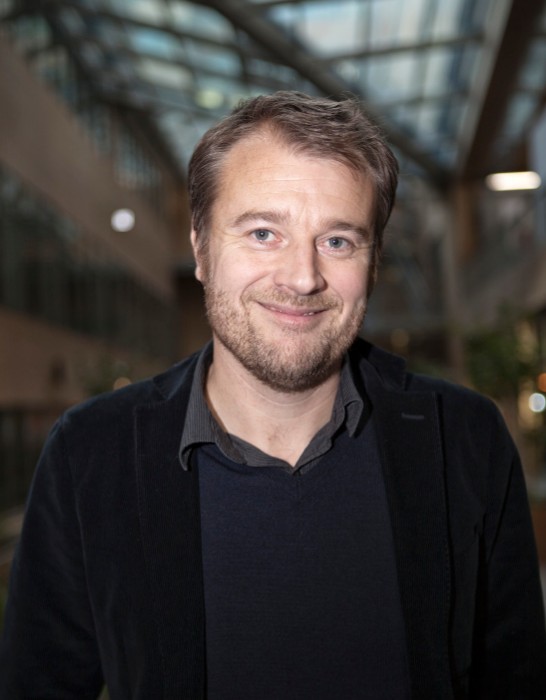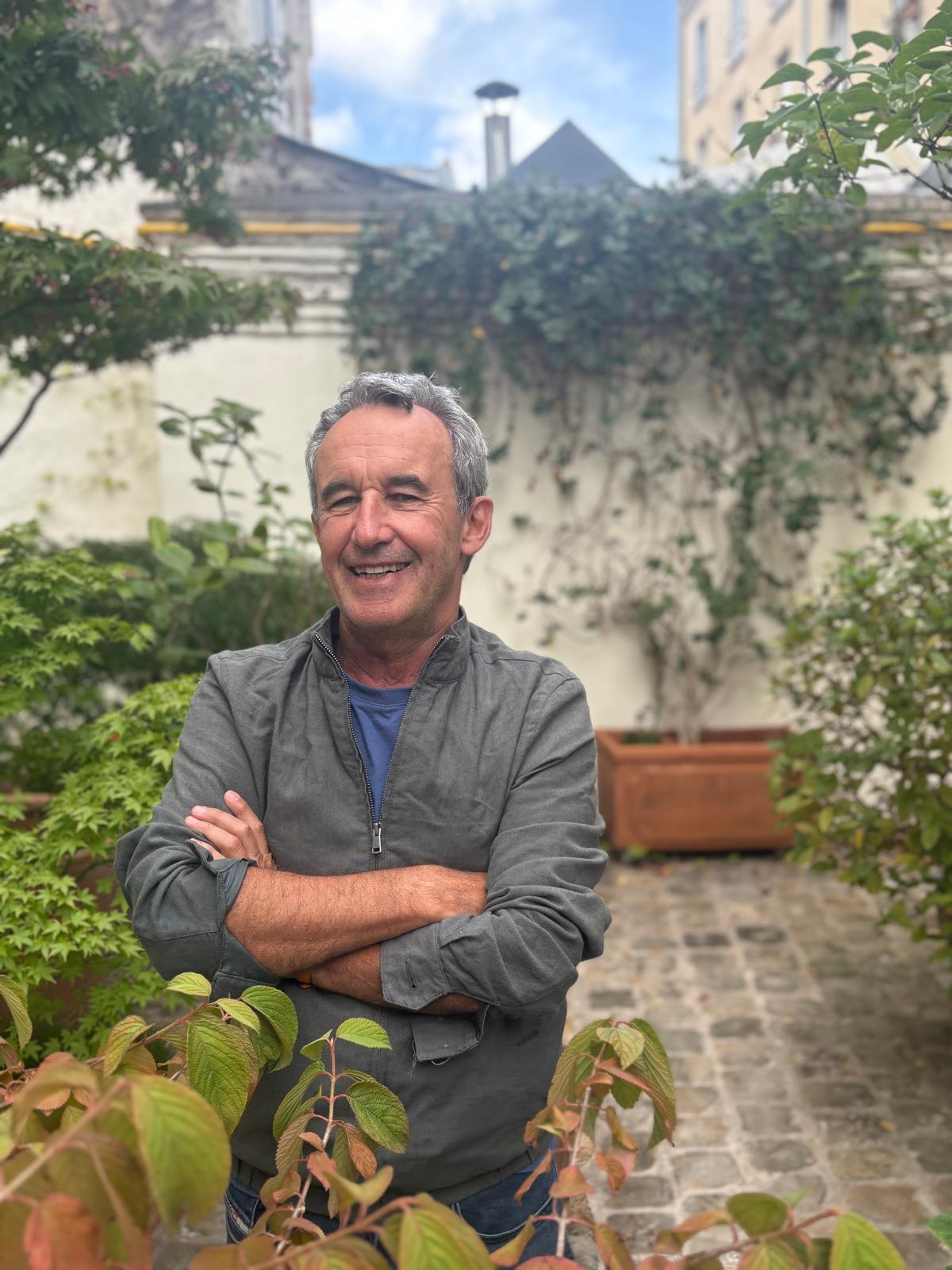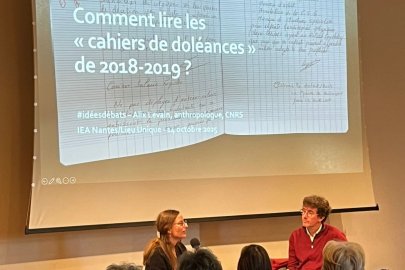This lecture series explores the tensions running through our contemporary democracies: the crisis of representation, the rise of post-truth, and the deepening of social divides. Drawing on concrete situations — from the United States to the Yellow Vests movement, including practices of participatory democracy — the aim is to question the limits of the current model and collectively imagine new forms of engagement, listening, and deliberation. A series designed to open up new possibilities and, perhaps, to reinvent the democratic promise.
Lecture Schedule
- Tuesday, October 14, 2025
- Tuesday, November 4, 2025
- Tuesday, December 9, 2025
- Tuesday, January 13, 2026
- Tuesday, February 10, 2026
- Tuesday, March 10, 2026
- Tuesday, April 28, 2026
- Tuesday, May 12, 2026
- Tuesday, June 9, 2026
Tuesday 14 October 2025 - How to Read the “Cahiers de Doléances” of 2018–2019?
With Alix Levain
The cahiers de doléances are inseparable from the Yellow Vests movement of 2018. Their symbolic weight both preceded and surpassed the movement itself, crystallizing the hope for an authentic popular voice. Unsurprisingly, they have attracted considerable interest—from grassroots movements, political organizations, and the academic world alike. How should we understand these grievances within public debate, and the conditions under which citizens expressed their concerns during this period, including those related to ecological questions? Drawing on a large-scale research project coordinated by the CNRS since 2018, Alix Levain shows how this rich material can illuminate the tensions running through French society today.
Alix Levain is an anthropologist and research fellow at the CNRS. Her research focuses on lived experiences in the context of environmental change, the politics of knowledge, and the affects associated with the degradation of coastal ecosystems. She has been working with the Yellow Vests in Finistère since 2019 and coordinates the research strand devoted to the relationship with ecology and environmental issues within the “ANR GILETS JAUNES” project*.
*The ANR GILETS JAUNES project is a unique collaborative research initiative, bringing together 50 people at the heart of an internationally significant research network.

Tuesday 4 November 2025 - The Death of Democracies: From Coup d’État to Voluntary Servitude?
With Florent Guénard
Do democracies die only when they are toppled by hostile armed forces? History abounds with coups and putsches of every kind, some more successful than others. Yet these events should not blind us to another reality: democracies also collapse when the passion for freedom wanes, and when, perhaps against our own will, we come to desire servitude.
Florent Guénard is a professor of political philosophy at the University Paris Est Créteil and editor-in-chief of La Vie des Idées. He is the author of La Démocratie universelle. Philosophie d’un modèle politique (Seuil, 2016) and La Passion de l’égalité (Seuil, 2022).

Photo © Hélène Robert
Tuesday 2 December 2025 - Participatory Democracy, Really?
With Loïc Blondiaux and Manon Loisel
Now more than ever, it is crucial to deliberate on the possible and desirable actions of public authorities. Recent democratic history reveals a wide variety of approaches: conventions, conferences, and randomly selected councils have explored new avenues for participatory mechanisms that have learned from so-called “token” forms of participation. But what impact have these initiatives had on local democracy, and what drives the transformation of political action at a time marked by confusion, distrust, and relativism?
Through an interactive participatory format, the audience will be invited to reflect, debate, and take a stance—or choose not to—on the challenges of participatory democracy.
Moderation : Laurent Devisme

Manon Loisel is a consultant-researcher in local public policies at the agency Partie Prenante. She teaches at Sciences Po Paris and is co-author, with Nicolas Rio, of Pour en finir avec la démocratie participative (Textuels, 2024) and Lettres aux 500 000 (futurs) élus locaux.
Loïc Blondiaux is a professor of political science at the University Paris I Panthéon-Sorbonne and a researcher at the European Center for Sociology and Political Science (CESSP) (CNRS/Paris I/EHESS). His research focuses on opinion polls, the history of social sciences, participatory democracy, and democratic innovations. He is the editor of the journal Participations and has chaired the scientific council of the GIS “Democracy and Participation” since 2009. He is notably the author of La démocratie des émotions, Presses de Sciences Po, 2018 (in collaboration), Le référendum d’initiative citoyenne délibératif, Note of the Terra Nova Foundation, 2019 (with Bernard Manin), Le tournant délibératif. Bilan et perspectives, Presses de Sciences Po, 2021 (with Jean-Michel Fourniau, Dominique Bourg, Marie-Anne Cohendet), and La démocratie écologique. Une pensée indisciplinée, Hermann, 2022.
Tuesday 13 January 2026 - Strong Emotions in Politics
With Alain Faure
What do a mayor, a deputy mayor, a polling officer, a governor, and a regional president have in common? Alain Faure conducted interviews with several hundred local elected officials in France, Italy, Canada, and Japan to better understand the role of passions in exercising power. He explores their wounds, their enthusiasm, and their blind spots. He identifies how these emotions operate in different roles (first responder, scapegoat, shepherd…) through which they become hyper-mediators at the crossroads of “sad passions” and the grandeur of politics.
Alain Faure is a CNRS research director. He has just published with PUG a short Essay on Strong Emotions in Politics in the free digital series Virus XXL de la recherche.
Mardi 10 février 2026 - Solo le 14 février ? Nouveaux regards sur les célibataires aux États-Unis
avec Romain Huret
Des « vieilles filles » aux « vieux garçons », les célibataires ont longtemps été perçu·es comme marginaux·ales. À partir du cas des États-Unis, Romain Huret propose une autre lecture : le célibat est un statut social qui révèle toutes les mutations sociales, les inégalités et les tensions qui traversent la démocratie américaine, entre quête d’indépendance et fragilisation du lien collectif.
Romain Huret est historien des États-Unis et directeur d’études à l’École des hautes études en sciences sociales. Il publie le 22 janvier 2026, Les oubliés de la Saint-Valentin. Des vies à l’ombre du mariage aux éditions La Découverte.

Mardi 10 mars 2026 - De quoi CNews est le nom ?
avec Nicolas Kaciaf
Comment une chaîne de télévision ouvertement positionnée en soutien à des idées et des acteur·ices de l'extrême droite a-t-elle pu voir le jour dans l'espace médiatique français ? Alors que les médias audiovisuels sont juridiquement tenus de respecter un principe de pluralisme « interne », CNews contribue à un processus de polarisation des débats publics et à un déplacement du centre de gravité idéologique vers la droite de l’échiquier politique. Cette rencontre cherche à identifier les conditions d’un tel basculement.
Nicolas Kaciaf est professeur des universités en science politique à Sciences Po Lille, membre du laboratoire CERAPS. Ses travaux de recherche portent sur la sociologie des médias et du journalisme.
Mardi 28 avril 2026 - Les Vipères ne tombent pas du ciel. L'écologie au défi des classes populaires
avec Eric Aeschimann
L'écologie est devenue l'objet d'un affrontement violent au sein de la société. Vue des classes populaires, elle prend la forme de mesures « prises en haut », coupées des réalités quotidiennes, qui sont violemment rejetées. En revanche, pour le monde des expert.es et des militant.es, elle a nécessairement raison, puisqu'elle s'appuie sur des faits scientifiques indiscutables. Concilier l'efficacité de l'action avec l'exigence démocratique, tel est le défi de l'écologie aujourd'hui.
Journaliste au « Nouvel Obs », Eric Aeschimann vient de publier Les Vipères ne tombent pas du ciel. L'écologie au défi des classes populaires, aux éditions Les Liens qui Libèrent.

Mardi 12 mai 2026 - La démocratie sans emprise ou la puissance du féminin
avec Corinne Peluchon
Comment expliquer le succès des partis d’extrême droite et pourquoi l’intrigue qui se noue entre leurs leaders et une population se distingue-telle de la fascination que certain·es autocrates de gauche peuvent exercer ? Analysant les causes structurelles qui rendent les personnes perméables aux discours de l’extrême droite, Corinne Peluchon s’interroge sur cette soudure narcissique qu’est l’emprise et en analyse les étapes. Comment peut-on réveiller le désir de vivre ensemble qui est indispensable à la vie dans une démocratie ? La puissance du féminin, qui désigne une potentialité de chaque être humain, bien qu’elle ait un lien étroit avec le féminisme, peut-elle nous y aider ?
Professeure à l’université Gustave Eiffel, Corine Pelluchon est spécialiste de philosophie morale et politique et d’éthique environnementale et animale. Elle a reçu en Allemagne le prix Günther Anders de la pensée critique pour l’ensemble de ses travaux en 2020 et le prix Leopold Lucas en 2025. Dernier ouvrage : La démocratie sans emprise ou la puissance du féminin (Rivages, 2025).







